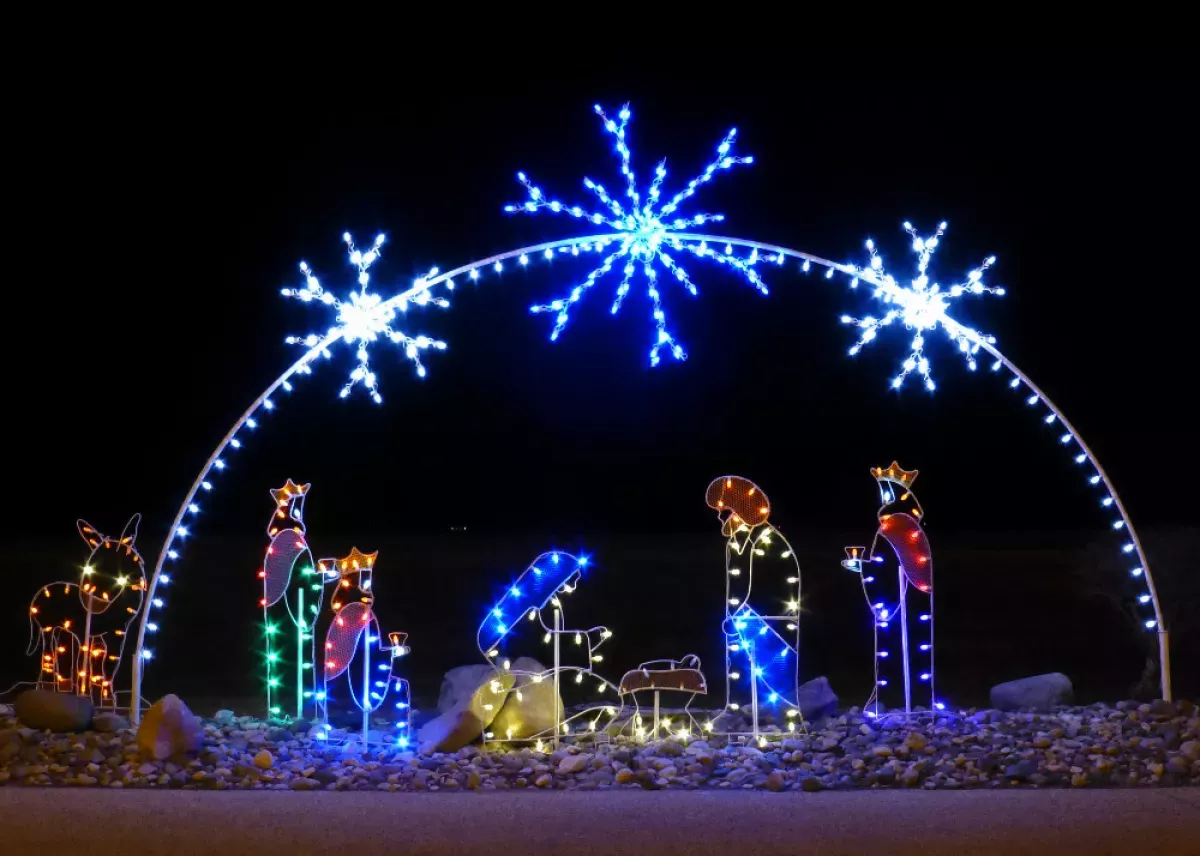Christmas is an annual festival celebrated on December 25th, commemorating the birth of Jesus Christ. It's a central liturgical feast in Christianity, with preparations beginning on the First Sunday of Advent, followed by Christmastide. Historically in the West, Christmastide lasts twelve days, culminating on Twelfth Night. Christmas Day is a public holiday in many countries and is observed religiously by most Christians, while also being culturally celebrated by many non-Christians, marking an integral part of the holiday season.
1902: Thomas Nast Death
In 1902, the German-American cartoonist Thomas Nast, one of the contributors to the modern Santa Claus image, died.
1904: First Christmas Seal Issued
In 1904, the first Christmas seal was issued in Denmark to raise funding to fight tuberculosis and bring awareness to the disease.
1914: Football Games in Christmas Truce
During the Christmas truce in 1914 of World War I, football games were played between opposing sides.
1914: Christmas Truces during World War I
In 1914, during World War I, informal Christmas truces occurred between opposing armies. These truces included promises not to shoot, socializing, gift-giving, and even sports between enemies.
1917: Prohibition of Christmas in the Soviet Union
In 1917, following the foundation of the Soviet Union, Christmas celebrations were prohibited in public due to the state's atheism.
1923: Revised Julian Calendar Adoption
Following the Council of Constantinople in 1923, several Orthodox Christians jurisdictions began using the Revised Julian calendar, which corresponds exactly to the Gregorian calendar.
1923: Armenian Church use of Gregorian Calendar
Since 1923, the Armenian Church in Armenia has used the Gregorian calendar.
1929: Persecution of Christmas Traditions
In 1929, on Christmas Day, children in Moscow were encouraged to spit on crucifixes as a protest against the holiday, part of a larger campaign against Christmas traditions by the League of Militant Atheists.
1946: Hark! The Herald Angels Sing in "It's a Wonderful Life"
In 1946, the traditional carol "Hark! The Herald Angels Sing" was featured in the film "It's a Wonderful Life".
1965: Last Christmas Day Football Fixture in England
In 1965, the last Christmas Day football fixture in England occurred, with Blackpool beating Blackburn Rovers 4–2.
1984: Lynch v. Donnelly
In 1984, the U.S. Supreme Court ruled in Lynch v. Donnelly that a Christmas display owned by the city of Pawtucket, Rhode Island, did not violate the First Amendment.
1991: End of Christmas Persecution in Russia
In 1991, with the dissolution of the Soviet Union, the persecution of Christmas ended, and Orthodox Christmas became a state holiday again in Russia after seven decades.
2001: Christmas Deadweight Loss in the US
It is estimated that in 2001, Christmas resulted in a $4 billion deadweight loss in the US alone due to the effect of gift-giving.
2002: Christmas Tree Harvest in the US
In 2002, 20.8 million live Christmas trees were cut in the United States.
November 2004: Expenditure in Department Stores
In November 2004, expenditure in department stores nationwide rose to $20.8 billion.
December 2004: Expenditure in Department Stores
In December 2004, expenditure in department stores nationwide rose to $31.9 billion, an increase of 54 percent compared to November.
2004: Christmas Day (Trading) Act in England and Wales
In 2004, the Christmas Day (Trading) Act prevented all large shops from trading on Christmas Day in England and Wales.
2007: Similar Legislation in Scotland
In 2007, similar legislation to the Christmas Day (Trading) Act was approved in Scotland.
2010: Christmas Church Attendance in the US
In 2010, a survey by LifeWay Christian Resources found that six in ten Americans attend church services during the Christmas season.
2010: Ancient Church of the East celebrates Christmas according to the Gregorian calendar
In 2010, the Ancient Church of the East decided to celebrate Christmas according to the Gregorian calendar date, though it follows the Julian calendar.
2010: Online Christmas Spending in the UK
In 2010, up to £8 billion was expected to be spent online at Christmas in the UK, approximately a quarter of total retail festive sales.
2015: Christmas Church Attendance in the UK
In 2015, the Church of England reported an estimated attendance of 2.5 million people at Christmas services.
December 2018: Anti-religious actions in China before Christmastide
In December 2018, Chinese officials raided Christian churches prior to Christmastide and coerced them to close; Christmas trees and Santa Clauses were also forcibly removed.
2023: Christmas Celebrations Cancelled in Bethlehem
In 2023, public Christmas celebrations were cancelled in Bethlehem due to the ongoing Israel–Hamas war, as decided by Palestinian Christian leaders.
2024: Julian Calendar Difference in 2024
As of 2024, there is a 13-day difference between the Julian calendar and the Gregorian calendar, meaning that December 25 on the Julian calendar corresponds to January 7 on the Gregorian calendar.
Mentioned in this timeline

It's a Wonderful Life directed by Frank Capra tells the...
Ukraine is a country in Eastern Europe the second-largest on...
The Union of Soviet Socialist Republics USSR existed from to...
China officially the People's Republic of China is an East...

Football is a family of team sports primarily involving kicking...
Russia officially the Russian Federation spans Eastern Europe and North...
Trending

57 minutes ago Victoria Jones, daughter of Tommy Lee Jones, cause of death revealed.

57 minutes ago Amber Glenn's Olympic short program: a blend of pressure and glory.

57 minutes ago America's 'Blade Angels': Liu, Glenn, and Levito, Prepare for the 2026 Winter Olympics.

58 minutes ago Kaori Sakamoto, Figure Skating Star, Aiming for Olympic Gold Before Potential Retirement

2 hours ago Anastasiia Gubanova shines in the Women's Single Skating Short Program at 2026 Olympics.

2 hours ago Tremaine Edmunds to the Bucs? Bears consider cutting T.J. Edwards: Analyst speculation surfaces.
Popular

Jesse Jackson is an American civil rights activist politician and...
Randall Adam Fine is an American politician a Republican who...

Pam Bondi is an American attorney lobbyist and politician currently...

Barack Obama the th U S President - was the...

Kid Rock born Robert James Ritchie is an American musician...
The Winter Olympic Games a major international multi-sport event held...
